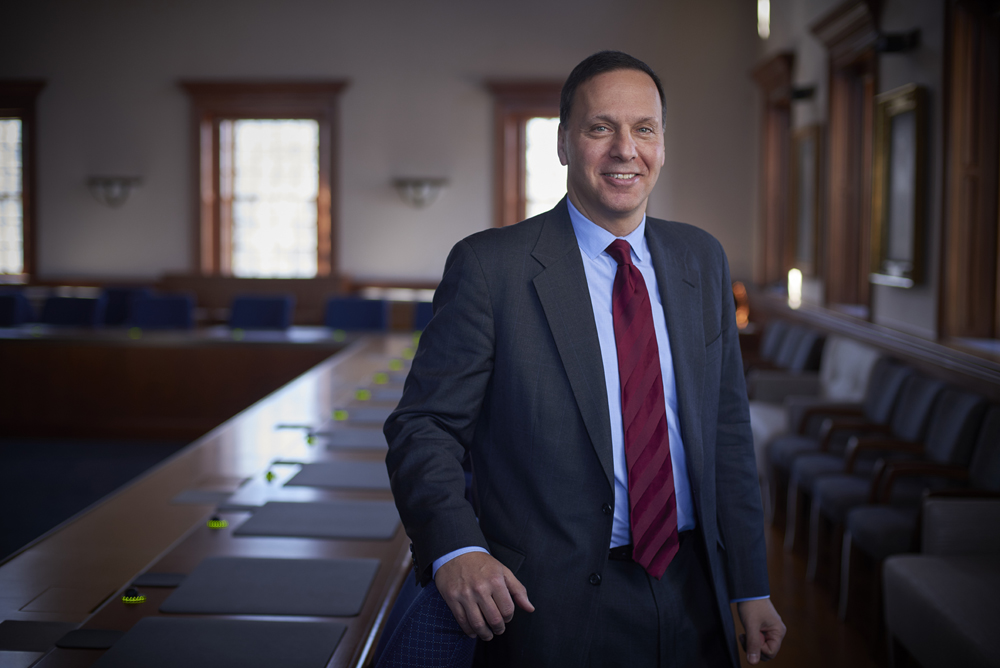
Ronald Liebowitz will be the new president of Brandeis University starting in July. (Brett Simison/Middlebury College)
There’s a lot in the news about college presidents grappling with diversity, race and ethnicity. But Ronald Liebowitz heads a campus established nearly 70 years ago as a national model of ethnic and religious pluralism. This month, Liebowitz became the ninth leader of Brandeis, a private research university that considers social justice central to its mission.
As part of our Leaders in Higher Education series of conversations On Campus' Kirk Carapezza sat down with Liebowitz before his official first day on campus in Waltham.
Interview Highlights
On Brandeis as a “Jewish University”:
Since its founding, Brandeis has done a great job of being open to all. Its founding mission was to support Jewish students, who have been denied admission to the finest private universities. The primary values of the Jewish tradition of high academic achievement, critical thinking, critical analysis, self criticism, are universal in terms of what they stand for in higher education. We want to be true to those roots but also look forward in being inclusive.
On the Boycott, Divestment and Sanctions (BDS) movement against Israel on campus:
From what I understand, the movement is minimal, compared to especially major universities. In fact in a recent student survey on campus, BDS movement was really nonexistent in terms of concerns especially with Jewish students, whereas on most campuses, Jewish students have felt very uncomfortable.
I think there is an anti-Israel and in some ways an anti-Semitic strain in society. It’s undeniable it’s happening in Europe, it’s happening elsewhere, but here at Brandeis, Jewish students have, at least, in the last year proclaimed through surveys, that they feel comfortable and that campus is a welcoming place.
On building a more diverse community:
I think the goal of diversity on a college or university campus is really to improve the educational experience of the students. Upholding this allows a university such as Brandeis to recruit and attract a diverse student body, so that students learn from one another. They engage much more freely and regularly students who have had different experiences and worldviews, and really teach one another about those differences. The goal, of course, is to get folks to interact and to do it in a way that’s a little bit different than what has been the norm here in society at-large.
Socioeconomic diversity is crucial. It’s not just about race, it’s not just about ethnicity, it’s about diversity in the larger scope of things. I do think we have to look at how financial aid is given and how it’s calculated. It doesn’t appear to be rocket science, but no one has been able to solve this. The very very wealthy institutions, still to some degree, have a bipolar income distribution.
On the politics of representation at Brandeis:
Many colleges are facing this issue. It’s a reflection in some large part to what’s going on in society, the type of debate and discussion, lack of civility in discussion. I think it’s really reached a point where students represent a large part of society and are questioning a lot of things that have been left unquestioned for some time.
Even with student demands for higher representation, quotas are difficult, percentages are difficult… it’s not an issue of a whole supply of colleagues or faculty members across all disciplines, it’s really a case by case basis. I will say that Brandeis has always had a goal of having a diverse community here, ever since 1948, and I see no deviation from that at all in the future.
On his leadership style as the former president of Middlebury College:
I was very much part of the institution simply because I was on the faculty for 32 years, and 20 years before becoming president. I had a certain perspective, which is a double-edged sword. Programs or approaches that I was responsible for or advocated for, as Provost and President probably looked very good to me, but they probably had some issues that had to be dealt with. I know that from my wife, who came on board to Middlebury, and asked some pretty good questions about the rationality behind some of my decisions. It was very very obvious that I had missed some of those things.
Here at Brandeis, I hope to bring a fresh set of eyes to the institution. I hope to spend a good amount of time listening, but also moving forward on a whole bunch of issues that Brandeis needs to address.
Related: Diversity in Higher Education Leadership Flatlines










